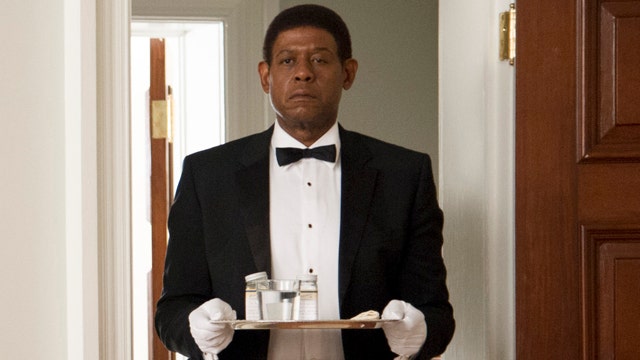Is 'The Butler' this year's first major Oscar contender?
Ashley Dvorkin and Fox 411 movie critic Justin Craig break down this week's movie releases: 'Lee Daniels' The Butler,' 'Jobs' and 'Kick-Ass 2'
“Lee Daniels' The Butler,” Oscar will see you now…
This superbly crafted and impeccably acted civil rights drama is the first major Oscar contender of the year. Directed by Lee Daniels (“Precious”) with a potent but uplifting script by Danny Strong, “Lee Daniels’ The Butler” is a tale of two faces on various fronts: first are the contrasting environments during the civil rights movement of Cecil Gaines, the butler to seven presidents, beginning with President Eisenhower (Robin Williams) and ending with President Reagan (Alan Rickman),as well as his struggle at home with his alcoholic wife Gloria (Oprah Winfrey) and his civil rights activist son Louis (David Oyelowo). Second, Daniels and Strong show the civil rights movement unfold from the regality of the White House as Cecil witnesses the presidents contend with self-preservation, reluctance, or a deep desire to heal the nation contrasted with the violent, chaotic and dangerous upheaval in the south through Louis’s point of view as he joins Martin Luther King and the freedom riders.
Expect to see Oscar nominations for Whitaker, Winfrey, Daniels and screenwriter Danny Strong, whose script covers a lot of territory, perhaps even too much territory. Based on the real-life account of Eugene Allen, butler to seven presidents, Strong starts off in the 1920s as young Cecil witnesses his mother’s rape and father’s murder on a cotton farm then takes us on a travelogue of the civil rights movement from the late 1950s through the turbulent 60s up to today. Over the span of two hours Strong weaves in scenes covering the sit-ins, Martin Luther King, the freedom riders, Malcolm X, the Black Panthers, de-segregation, Vietnam, Kennedy’s assassination, Nixon’s resignation and more.
While this is an incredible amount of history to cover in a two hour film, while also including Cecil’s personal drama, Daniels and Strong do an adequate job of balancing the bullet points of history while also creating a highly emotional drama. The brutality of the era isn’t softened or lightened as it was in recent films like “The Help.” Daniels and Strong keep the situations raw, but the rush through history inadvertently weakens the impact.
The strongest impact, though, comes from Cecil and Louis’ relationship since it shows most clearly the similarities and contrasts of ideologies between father, son and a struggling nation.
Louis is reactionary, eager to jump to fight for his equality at no matter the cost. Cecil, too, wants equality, but is reserved in his actions while slowly, in his own way, shaping the political course of the civil rights movement. Their story is remarkable and one that could have benefited better as a television series where more time could be given to each historical moment.
The acting, as to be expected from this cast, is phenomenal. Oscar-winner Forest Whitaker is a tour de force as Cecil Gaines. Unlike his robust Oscar-winning performance as Idi Amin in “The Last King of Scotland,” Whitaker delivers a delicate and incredibly subtle performance. Whether Cecil is witnessing atrocities on the news or overhearing racist remarks from political leaders within the same room, Whitaker displays so very much with so little effort.
Oprah Winfrey, too, delivers a subdued, quiet performance as Gloria, Cecil’s wife who battles alcoholism and the frequent absence of her husband. Gloria is thrust between father and son, both fighting in their way for the same thing, and as that buffer, while also proclaiming her own independence, Winfrey is at her most sensitive. In her first live-action role since 1998’s “Beloved,” Winfrey is in top form, not having missed a beat.
Daniels makes a bold move by casting a slew of famous actors to play iconic U.S. presidents. On the surface, it appears that casting Robin Williams, James Marsden, John Cusack, Liev Schreiber and Alan Rickman as presidents could be kitschy, but these actors become chameleons, morphing very quickly, subtly and naturally into these famous personas that only for the briefest of moments will you notice the actor beneath. Marsden and Rickman are especially good as Kennedy and Reagan. Rickman delivers a methodical, earnest performance as the 40th president while Jane Fonda makes a brief appearance as Nancy Reagan.
The rest of the supporting cast is a who’s who of celebrities: Cuba Gooding Jr., Mariah Carey, Terrence Howard, Vanessa Redgrave, Lenny Kravitz, Minka Kelly, Alex Pettyfer and Clarence Williams III.
Editor Joe Klotz does an impeccable job cutting this picture, keeping the various story lines running smoothly while often editing between the contrasting regality of the White House and the brutality in the south. Klotz’s editing is as much an emotional impact here as Whitaker’s performance.
Daniels expertly leaves the film with a great sense of accomplishment, pride, and most importantly, hope without ever stooping to an oversaturation of sentimentality. While this isn’t the greatest film depicting the civil rights movement, it is certainly one of the most unique. Though this is a delicate and hope-filled film, Daniels lets the images of brutality, bigotry and unequivocal struggle linger in the mind long after the film has ended, making for an endearing yet powerful cinematic experience.
MPAA Rating: PG-13. Running time: 2 hours and 6 minutes.






















